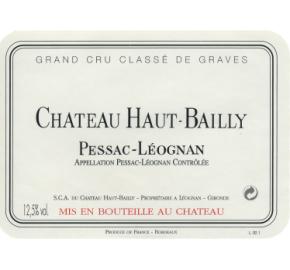
Chateau Haut-Bailly 2012
- Producer Chateau Haut-Bailly
-
Blend
60% Cabernet Sauvignon
40% Merlot - Country France
- Region Bordeaux
- Appellation Pessac-Leognan
- UPC 0 15643 52533 9
Log in to view pricing and order online
Don't have an account? Register here
Item# 1757-12
James Suckling
94pt
Wine Enthusiast
94pt
Wine Spectator
93pt
Vinous Media
93pt
Wine Advocate
94pt
Harvest
The harvest started when the phenological maturity (tannins) caught up with the technical maturity (sugar, acidity). The Merlots were picked from September 27th to October 8th, little by little in ideal conditions. The weekend of October 7th was especially hot and wet (97% hygrometry), causing us to quicken the pace and pick the Cabernets before the return of the rain. The Merlots were pleasant and full of charm.
The Old Vines delivered splendid Cabernets, typical of the great terroir of Haut-Bailly. In general, the grapes were small and concentrated, bright and aromatic with excellent extractability level. They were vinified gently at low temperatures for 25 days.
Vintage
The 2012 vintage plays like a foxtrot – in four defined steps...
1. Following a cold dry winter, a cool, wet spring made the flowering process difficult and threatened some Merlot vines with "coulure".
2. As cool temperatures persisted until the beginning of July, we kept an extra careful eye on the vineyard and fought the onset of diseases (mildiou, oïdium). The team remained on hand throughout the summer to carry out leaf thinning and other early work. A protracted and uneven "veraison" period forced us to complete a second green harvest in order to eliminate unripe bunches.
3. The month of August had the advantage of wide temperature ranges with hot days; as sunny as in 2000 or 2009, with highs of 39 Celsius during the second fortnight, and cool nights. All which favour the synthesis of anthocyanin. Traditional tilling of the soil allowed better management of hydric stress from mid-August onwards, as the continued good condition of the leaves testified.
4. At the end of a summer-like month of September, a few millimeters of rain on September 25th and 26th helped to re-kindle the ripening of the grapes, which led to the sublimation of the fruity character of the skins and the softness of the tannins.
1. Following a cold dry winter, a cool, wet spring made the flowering process difficult and threatened some Merlot vines with "coulure".
2. As cool temperatures persisted until the beginning of July, we kept an extra careful eye on the vineyard and fought the onset of diseases (mildiou, oïdium). The team remained on hand throughout the summer to carry out leaf thinning and other early work. A protracted and uneven "veraison" period forced us to complete a second green harvest in order to eliminate unripe bunches.
3. The month of August had the advantage of wide temperature ranges with hot days; as sunny as in 2000 or 2009, with highs of 39 Celsius during the second fortnight, and cool nights. All which favour the synthesis of anthocyanin. Traditional tilling of the soil allowed better management of hydric stress from mid-August onwards, as the continued good condition of the leaves testified.
4. At the end of a summer-like month of September, a few millimeters of rain on September 25th and 26th helped to re-kindle the ripening of the grapes, which led to the sublimation of the fruity character of the skins and the softness of the tannins.
